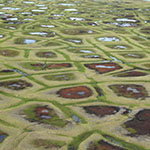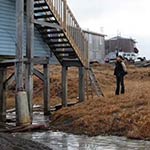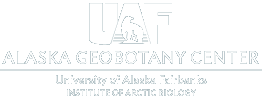Project Abstract

Ice-rich permafrost is ground that is frozen year 'round for two or more years and contains large amounts frozen water that will become liquid upon thawing. This ice is the most susceptible element of arctic landscapes to climate warming.
Nearly 50% of the Arctic has ice-rich permafrost. For example, the upper 4–5 meters of the land along Alaska’s northern coast contains an estimated 77% ice. Thawing of ice-rich permafrost affects entire arctic ecosystems and makes the ground unstable to build upon. Thus, ice-rich permafrost is conceived as having a role similar to that of a “keystone species” in ecology, whereby if the keystone element is removed or drastically reduced, the entire system is radically changed. In order to better understand the intricate connections between the ice-rich permafrost and the larger arctic human-ecological system, this project will explore how differences in climate, snow, water, level of disturbance, and time influence the accumulation and loss of ground ice in permafrost landscapes and how people and their infrastructure can adapt to changing ice-rich permafrost. The ultimate goal is to understand ice-rich permafrost at local, regional and circumpolar scales
The project will focus in the Prudhoe Bay oilfield and the village of Point Lay, Alaska, where permafrost temperatures are changing rapidly and there are large impacts to ecosystems, industrial infrastructure and local communities. Both areas contain excellent examples of ice-rich permafrost-related problems relevant to many other areas of Alaska and circumpolar Arctic, so the work will have broad applications elsewhere. Three ice-rich permafrost observatories are proposed: 1) a Roadside Ice-rich Permafrost Observatory in the Prudhoe Bay Oilfield; 2) a Natural Ice-rich Permafrost Observatory remote from infrastructure; and 3) a Village Ice-rich Permafrost Observatory at Point Lay. Ground-level observations of ground ice, hydrology, vegetation; and greenhouse-gas fluxes will be conducted and remote-sensing will be used to measure and monitor changes from space.
 Much of the response to infrastructure damage caused by severe thermokarst (thaw-related subsidence of the ground surface) is repair and stabilization of existing structures. There is an immediate need to develop more strategic approaches to mitigate damage and adapt to change. Point Lay, Alaska, is experiencing some of the most severe ice-rich permafrost-related impacts of any place in the Arctic but has received relatively little research and agency attention. Researchers from the University of Alaska’s Institute of Arctic Biology, Institute of Northern Engineering, and Geophysical Institute will work together with the Cold Climate Housing Research Center (CCHRC), the Point Lay community, the Regional Housing Authority, and North Slope Borough to address these issues. Wherever possible the team will use local experience with ice-rich permafrost to help develop housing strategies that will be relevant to many arctic villages facing similar impacts.
Much of the response to infrastructure damage caused by severe thermokarst (thaw-related subsidence of the ground surface) is repair and stabilization of existing structures. There is an immediate need to develop more strategic approaches to mitigate damage and adapt to change. Point Lay, Alaska, is experiencing some of the most severe ice-rich permafrost-related impacts of any place in the Arctic but has received relatively little research and agency attention. Researchers from the University of Alaska’s Institute of Arctic Biology, Institute of Northern Engineering, and Geophysical Institute will work together with the Cold Climate Housing Research Center (CCHRC), the Point Lay community, the Regional Housing Authority, and North Slope Borough to address these issues. Wherever possible the team will use local experience with ice-rich permafrost to help develop housing strategies that will be relevant to many arctic villages facing similar impacts.
The project partners will work with local residents, government agencies, the oil industry and the Alaska Department of Transportation and Public Facilities to develop best practices for road and house construction and related education materials. A post-doctoral student, a graduate student, and two undergraduate students will be part of the research team. The results will be communicated to circumpolar communities and the broader public and through the Rapid Arctic Transitions due to Infrastructure and Climate (RATIC) action group of the International Arctic Science Committee (IASC) and the Terrestrial Multidisciplinary distributed Observatories for the Study of Arctic Connections (T-MOSAiC).
Read the proposal (NSF Award No. 1928237)
Get In Touch
The Alaska Geobotany Center is located on the West Ridge of the University of Alaska Fairbanks campus. Our office is located in room 252, on the second floor of the Arctic Health Research Building.
